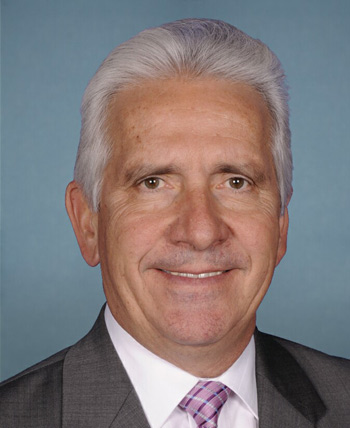March 18, 2018 - The newly introduced and bipartisan H.R. 5275, Agricultural Certainty for Reporting Emissions (ACRE) Act would avoid unnecessary environmental reporting, which has been opposed by Republican and Democratic administrations  alike. Reps. Billy Long (R-Mo.) and Jim Costa (D-Calif.) introduced the bill together with 85 original, bipartisan cosponsors.
alike. Reps. Billy Long (R-Mo.) and Jim Costa (D-Calif.) introduced the bill together with 85 original, bipartisan cosponsors.
“This legislation is critical,” American Farm Bureau Federation President Zippy Duvall said. “Without it, farmers and ranchers must comply with a law that was never supposed to affect them – the Superfund program (CERCLA). Congress never meant to include agriculture under these reporting obligations, but because of a misguided court ruling, farmers and ranchers are vulnerable. We support swift passage of the ACRE Act and applaud Reps. Long and Costa for their work on this issue.”
Under current regulations, approximately 200,000 farms and ranches could be legally obliged to report emissions from animal agricultural operations, even though those rules were written to cover industrial emergencies, rather than routine, low level emissions from farms and ranches
The EPA under both the Bush and Obama administrations supported exempting these agricultural producers, but a federal court found the law did not clearly exclude farms and ranches. The ACRE Act would clarify that such producers are not required to report these emissions.
In the Senate, S. 2421, the Fair Agricultural Reporting Method (FARM) Act has been introduced by Sens. Deb Fischer (R-Neb.) and Joe Donnelly (D-Ind.). The legislation also has bipartisan support and could be brought up in the Senate Environment and Public Works Committee soon.
Source: American Farm Bureau Federation
Congressmen Long and Costa Lead Bill to Protect Farmers, Ranchers, and Dairy Producers
March 18, 2018 - Washington, D.C. – Last week, Congressmen Billy Long (R-MO-7) and Jim Costa (D-CA-16) introduced H.R. 5275, the Agricultural Certainty for Reporting Emissions Act, or ACRE Act, in the U.S. House of Representatives with strong  bipartisan support. The legislation aims to rectify a widely-understood shortcoming with the Comprehensive Environmental Response, Compensation, and Liability Act (CERCLA), a law which has provided for the clean-up of severe industrial chemical toxic waste for over 30 years.
bipartisan support. The legislation aims to rectify a widely-understood shortcoming with the Comprehensive Environmental Response, Compensation, and Liability Act (CERCLA), a law which has provided for the clean-up of severe industrial chemical toxic waste for over 30 years.
(Left) Congressman Jim Costa
If CERCLA were to be applied to agriculture operations, 200,000 ranchers, livestock farmers, and dairy producers in the United States would be subject to regulation created to address toxic waste dumps and spills, such as chemical tank explosions. Yet, a recent court decision threatens to make this regulation a daily reality for agriculture producers as soon as May of this year. The ACRE Act will prevent CERCLA from applying to farms, thus freeing farmers, ranchers, and dairy producers from the unintended application of CERCLA, and providing them the certainty they need to run their operations.
“Unfortunately, common sense is not common in Washington, D.C.,” said Rep. Long. “The bipartisan ACRE Act distinguishes between farms and hazardous waste sites to relieve farmers and ranchers of burdensome paperwork and allows them to do their jobs free from unnecessary government regulation. With southwest Missouri being home to hundreds of farmers and ranchers, this practical legislation would allow these men and women to focus on their farms rather than on filling out government forms.”
Congressman Costa, a third-generation farmer in California’s San Joaquin Valley and a senior member on the House Agriculture Committee said, “The ACRE Act is good for our farmers and our food system, both in the San Joaquin Valley and across the United States. It is bipartisan, commonsense legislation that respects the need for certain types of regulation while refusing to allow blind regulation from harming our agriculture system, our businesses, and our communities.”
Because Congress did not expressly state that CERCLA does not apply to farms, the law designed to address toxic waste and superfund sites can be used to regulate the naturally-occurring farm emissions which result from the daily ins-and-outs of raising livestock. Yet, most agree that Congress never intended a law designed to address industrial chemical toxic waste to be applied to farms. Along these lines, the Environmental Protection Agency issued a rule under the Bush Administration exempting farms from CERCLA’s emissions reporting requirements in 2008, and the Obama Administration successfully defended the farm exemption in federal court for eight years. However, a recent court decision revoked the exemption, with the court ruling that the EPA did not have the legal authority to issue the rule. By explicitly stating the farm exemption, the ACRE Act seeks to make the exemption permanent, restoring Congress’s intent to the original law and protecting agriculture operations from regulatory overreach.
Source: Congressman Jim Costa









